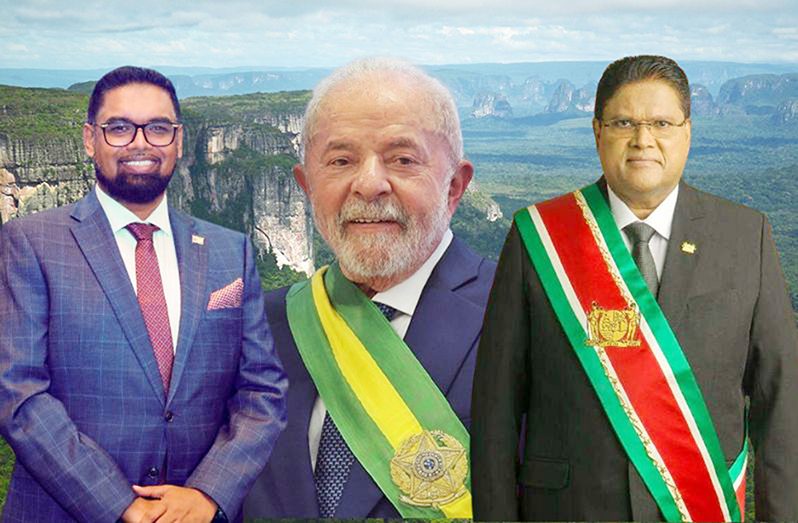–trilateral working groups to focus on infrastructure, energy and security
A TRILATERAL meeting among the Presidents of Guyana, Brazil, and Suriname has set the stage for a comprehensive strategic roadmap, which will see working groups being established in infrastructure, energy, and security for a more interconnected, secure, and sustainable future in the region.
On Thursday, Guyanese President Dr. Irfaan Ali; Brazilian President Luiz Inácio Lula da Silva and Surinamese President, Chandrikapersad Santokhi, issued a joint declaration following a trilateral working meeting.
The Heads of Government were accompanied by their respective delegations on the margins of the 46th Regular Meeting of the Conference of Heads of Government of the Caribbean Community (CARICOM) at the Marriott Hotel in Georgetown, on Wednesday.
When reviewing the stage of relations among the three countries, the presidents agreed to establish trilateral working groups, at the technical level, in the areas of physical and digital infrastructure, energy, and joint initiatives against transnational illicit activities.
President Lula, in his address on Wednesday, underscored the importance of improving connectivity and cooperation between Brazil and the Caribbean to meet supply demands and bolster food security.
“We want to pave our way to the Caribbean. We will open corridors capable of meeting supply demands and strengthening food security in the region,” Lula said, highlighting the strategic integration of the Guiana Shield, which includes Guyana, Suriname, and Brazil.
INFRASTRUCTURE CONNECTIVITY
In the area of infrastructure, the presidents recognised the opportunity to advance in the consolidation of projects that strengthen the physical and digital connectivity between the three countries.
Notably, they recognised the potential in projects like the full paving of the Linden-Lethem Road, linking Brazil’s Roraima state to Georgetown. This project aims to enhance connectivity and facilitate the movement of agricultural and mineral products between the countries.
Additionally, they emphasised the importance of modernising road connections between Amapá in Brazil and the capitals of Guyana and Suriname via French Guiana. This, the presidents said, not only enhances regional connectivity but opens avenues for trade and investment facilitation.
ENERGY COLLABORATION
In the energy sector, the leaders agreed to deepen cooperation in oil and gas exploration and production, including regulation and contingency plans and emergency response.
“They expressed interest in the development of sustainable projects of hydroelectric generation and integration of electrical networks, in order to strengthen the energy security and efficiency of regional systems,” the joint declaration read.
The energy corridor could also include an ambitious 3,000-megawatt power interconnection among Guyana, French Guiana, Suriname and Brazil.
The project is called Arco Norte under the umbrella of the Inter-American Development Bank (IDB). A feasibility study had given the greenlight to the natural gas supply project from Suriname and Guyana to electricity generation plants in Brazil.
The development of renewable energy modalities, including bioenergy, is also on the agenda, which is set to not only ensure a diversified and secure energy landscape but also align with global efforts toward sustainability.
SECURITY COOPERATION
The porous borders of Guyana, Suriname, and Brazil have facilitated the dominance of international criminal groups in various illicit markets like human trafficking, illegal gold mining, and arms and drug trafficking
As such, the presidents reaffirmed their commitment to combat transnational crime through joint police operations, intelligence exchange, and capacity-building activities.
Notably, they highlighted the use of remote sensing images as a tool to tackle organised crime.
While expressing satisfaction with ongoing initiatives in the Guiana Shield region, the leaders urged security agencies to intensify cooperation and establish working groups.
The establishment of trilateral working groups signifies a commitment to shared goals. Through these groups, the presidents aim to deepen collaboration in critical areas, reinforcing the importance of Amazonian and South American integration.
The working groups are expected to report the progress attained to the ministers responsible for the respective areas, for consideration in trilateral meetings of the ministers.
As they work towards a more just, inclusive, and equitable global order, the joint efforts of Guyana, Brazil, and Suriname are poised to have a lasting impact on the socio-economic development of their respective populations.



.jpg)








